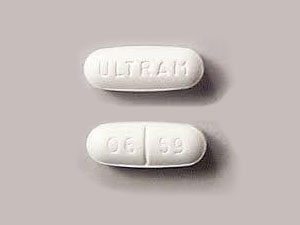Ultram
Uses
The medication is prescribed to alleviate mild to moderately intense pain. Tramadol is like opioid analgesics. It is a chemical that works within the brain to alter the way your body reacts to pain.
How to use Ultram
Check out the medication Guide that is provided from Your pharmacist before you begin using tramadol and every time you receive a refill. If you have any concerns you should ask your doctor or pharmacist.
You can take this medication by mouth as prescribed by your physician, typically once every four to six hours, as necessary to relieve pain. You can take this medication in conjunction with food or not. If you suffer from nausea it might be beneficial to take this medication alongside food. Consult your physician or pharmacist for other methods to reduce nausea (such as lying down for between 1 and 2 hours , with as the least amount of head movement as you can).
If you're taking the liquid version the medication you must carefully determine the dosage using an instrument or spoon that is specifically designed for measuring. Avoid using a regular spoon as you might not receive the right dosage.
The dosage will depend on the medical conditions you have and your the response to treatment. To decrease the chance of adverse reactions your doctor might advise you to begin this medication with a small dose , and then gradually increase your dosage. Follow your doctor's prescriptions with care. The recommended dose for you is 400 milligrams a day. If you are over 75 years, the dosage recommended is 300 milligrams a day. Do not increase the dosage or take the medication more often or for longer than recommended. Stop the medication properly when it is directed.
Side Effects
Constipation, nausea, vomiting dizziness, lightheadedness headache, or drowsiness could be experienced. Certain of these adverse effects can diminish when you've been taking the medication for a period of time. In the event that any one of these side effects persist or become worsening, consult your physician and pharmacist immediately.
To stop constipation to prevent constipation, eat diet fiber as well as drink enough fluids as well as workout. It is also possible to use the medication to relieve constipation. Ask your pharmacist what kind of laxative is appropriate for your needs.
To lessen the chance from dizziness as well as lightheadedness To reduce the chance of dizziness and lightheadedness, slowly get up in a standing or lying down position.
Be aware that your physician has given you this medication because the doctor has determined that the value for you is more than the potential risk of side negative effects. A majority of people who take this medication don't suffer severe side effects.
Contact your physician immediately If you are experiencing any serious side effects such as: irregular breathing while you sleeping (sleep apnea) or changes in your mood (such as hallucinations, agitation) and abdominal pain, stomach or stomach or difficulty urinating, symptoms of your adrenal glands not functioning properly (such as a loss of appetite, fatigue and the loss of weight).
Seek medical attention immediately If you experience any grave side effects, like irregular heartbeat, rapid heartbeat extreme dizziness, falling asleep, seizure.
Precautions
Before you start taking tramadol consult your physician or pharmacist whether you're allergic to it or if you suffer from additional allergy. The product could contain inactive ingredients that can trigger allergic reactions or other issues. Consult your doctor for more information.
Before taking this medication inform your physician or pharmacist about your medical history, focusing on conditions of the brain (such as head injuries or tumor, seizures, etc.) or breathing problems (such as sleep apnea and asthma chronic obstructive lung disease (COPD) liver disease, kidney disease, mental and mood disorders (such as depression, anxiety, confusion or suicidal thoughts) and a personal or family background of a substance-use disorder (such as addiction to or dependency to alcohol or drugs) stomach/intestinal disorders (such as constipation, obstruction or diarrhea caused by infections or paralytic ileus) and difficulty in to urinate (such due to an the prostate becoming enlarged) Gallbladder disease, diseases in the pancreas (pancreatitis) or weight gain.

Comments
Post a Comment